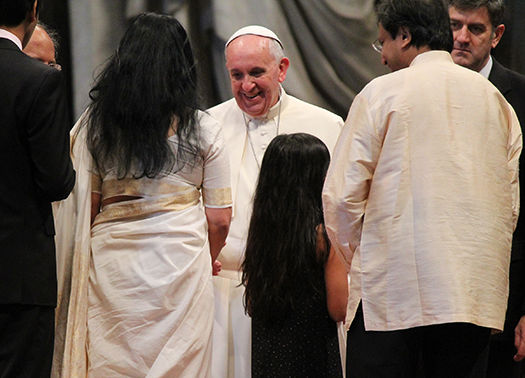As a professor at Loyola Marymount University, I work with inquisitive young people, and I have seen an amazing "Pope Francis effect" on our campus since his election to the papacy one year ago.
I would characterize what has happened in three ways:
—Young people are energized about their faith tradition. To say they are Catholic brings with it a measure of pride and belonging that many of them have never experienced before. We have even started a Pope Francis club on our campus.
Many of my students are also busily writing research papers about Pope Francis and his formation. In him they see an example, a living model, of doing good for the world.
—Non-Catholics are intrigued and engaged. I am delighted to see students who profess no religious faith at all be enthralled by the kind of solid ethics that Pope Francis is lifting up for the world. I read in their writings and hear in the classroom their deep appreciation for the embrace that Francis offers them, they feel accepted and welcomed, not judged.
In this I think our pope has been profoundly effective in mirroring Jesus' own practice of sharing the table with everyone, especially with those others exclude. I had often thought that it must have been difficult to not want to know Jesus more deeply after sharing the table with him. Pope Francis is imitating Christ beautifully in this sense and inviting everyone to share the abundance.
—We are all awakened. Pope Francis' deeds and then his words lay claim on our attention, focus us away from worthless pursuits, and direct our gaze toward Jesus' uncompromising law of love.
My students show a renewed wakefulness to all that really matters, to asking difficult questions, to standing up for what is right. Pope Francis' constant call to compassion and to love reaches them and they feel like they can rightly proclaim that some things are quite right ("love and care of the poor”) and some things are quite wrong (“treating human beings like things, or like means to an end”).
In other words, all choices have consequences and not all consequences are good; we must discern our actions. In Pope Francis we have a leader who encourages us all to think deeply about the problems of our world, to be critical of systems that create more victims, and to really live into the motto made popular by Father Pedro Arrupe (who was the Jesuit Superior General when Pope Francis was a young man) of being "men and women for others."
I am praying for many years of health for our Papa Francisco, that he may teach us with his wisdom and example to be true companions of Jesus.
Cecilia González-Andrieu, PhD., is associate professor in the Department of Theological Studies at Loyola Marymount University in Westchester. Her most recent book is “Bridge to Wonder: Art as a Gospel of Beauty” (Baylor University Press, 2012).

